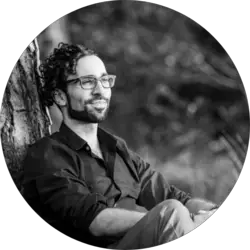![How To Deal With Sensory Overload [9 Tips For Overstimulation]](https://happyrubin.com/wp-content/uploads/2019/12/ik-ben-overprikkeld-150x150.jpg)
The Map Is Not The Territory: Explained (Does The Absolute Truth Exist?)

Does the (absolute) truth exist? When is something truth? In this article, let’s look at ‘answers’, meanings, and beliefs around these philosophical questions. We do this with the analogy ‘The map is not the area.’ Read along…
Contents of this page:
‘Absolute truth does not exist’ can be a very peaceful attitude to life
“There is no truth” may sound “harsh,” but with this belief you can bring respect and peace to the world.
By believing this and applying it as a way of life, you will no longer have the tendency to force your truth on someone . Also, you will no longer have the urge to want to change the truth of another person. Never mind that you wouldn’t want to accept the truth from another.
In short, you immediately evoke a sense of respect and acceptance for other people’s worldview . This respect intention is the reason that this belief is in the NLP Fundamentals .
Reality is nothing but your interpretation of it.
‘The truth does not exist’ has been given a depressing edge by Nihilism
Also one of the hallmarks of Nihilism is the belief that there is no absolute truth. ‘There is no absolute truth’ is therefore known as a Nihilistic statement.
However, Nihilism is quite a depressing angle to view this. It is certainly possible to view ‘the absolute truth does not exist’ from a positive angle, as shown in the previous section.
Let’s discover the statement ‘The map is not the area’ (& ‘Perception is projection’)

There is a difference between the world itself and how we experience the world. The way we model the world is only a reference to reality. It is not reality itself.
Alfred Korzybski summarized this principle in the analogy: “The map is not the area.” When you make a map of a city, you see the streets as colored lines. A white street line on the map is different from the actual street. For example, not all pavement tiles are drawn on the map and the street is not really white like the stylized street line on the map.
On the inside we also make a ‘map’ of the world in which we leave out, generalize and distort all kinds of things . And that card is different for everyone . How we ‘represent’ (see) the world is only our own interpretation. It is our image of reality, and we act and think according to that.
There is a difference between truth and reality.
Our language (symbols) alone is ‘guilty’ of this. Also with language a lot is omitted: the words we use are not the same as the event or object they represent. For example, we have created nouns. A noun is not part of nature but it is part of our speech.
There are actually two ‘lives’ running simultaneously: reality , and symbols and language that represent reality . Symbols and language are secondary.
‘Do you swear to tell the truth, the whole truth and nothing but the truth?’
‘Nobody can tell the’ whole truth ‘. It’s subjective. It has been filtered through our own experiences. ‘
– Dr. Lightman (from Lie to Me)
And if you also want to communicate with someone , it becomes even more interesting. This is done as follows:
- You only grasp a small part of reality, distort and generalize it considerably and place it in your own ‘map of the world’.
- Then you communicate – through the limited power of words – even a small part of your map of the world to other people.
- And finally , others also pick up those words in a completely different way than you – the sender – intended them to. Other people give those words different meanings because they have very different generalizations, distortions, and omissions. Moreover, your words – which are already an omission, distortion and generalization – are also distorted, omitted and generalized by the recipient of your words.
This process of omission, distortion and generalization is inevitable. It’s all around us and there is talk of it in every conversation …
Discover this principle further?
- Read the principle ‘The map is not the area & Perception is projection’ in the article on the NLP presuppositions.
- Read the article: ‘The world is your mirror. Perception is projection. ‘
- Discover the law of selective perception : you will always find evidence for what you choose to believe. Choose to believe in Love, and the evidence for Love will appear.
- And for a ‘biological’ foundation: read the communication model.
- Read more about ‘space’, or ‘mere consciousness’ . Nothing exists. Except vibration and empty space. Everything else is illusion or opinions.
Nobody sees what you see. Even if they see it too.
– Chris Ferreiras
Respect the model (the map / representation) of the world of the other person

Once you conclude for yourself that there is no absolute truth, you could use it to develop and show your worth of ‘respect’.
Fascism makes sense to some people. Free love is very good according to others. And maybe not according to you. Meanwhile, we all live in the same world and find evidence to support our beliefs.
Your conception is your reality. That goes for everybody. Park your prejudices and immerse yourself in the world model of the other. Your world model is never the truth: it is always different from reality. You can read all about this in the NLP communication model.
“I have the world model. Mine is right, and you have to agree.”
Of…
“My view is my reality. That applies to everyone. I park my prejudices and I immerse myself in the world model of the other. My world model is never the truth: it is always different from reality because it filters reality.”
Recently someone asked me: “NLP should be taught in all primary schools! Then the children can learn everything about such important things as respect and self-confidence! Why isn’t that being done?” “Because we see it that way. This is how we see it. Other people see it very differently.”
And what if a client says that there are a lot of non-fulfilled verbal agreements with the contractor, while the contractor believes that everything has been fulfilled? Then as a mediator you could say the following to them:
Frank, I hear your memory of this is x, and I fully believe this is your memory of this. And at the same time I fully believe Piet that his memory about this is different. And it is unfortunate that we cannot go back in time so that we can hear word for word what was said in that conversation. I don’t know what was said either, because I wasn’t there either. But what I want to do now is find out together how we can meet your needs and your needs, while at the same time remaining respectful of what your memories are of that event.
This often happens in children: “The sky is green!” “No, the sky is blue!” With a lively discussion about whether the sky is really green or really blue.
So I hear you describe the world as a place with a blue sky and if you describe it that way, a lot of people will agree with you. And now Pietje sees the world as a place with a green sky. And that’s completely okay. he can do that, even if you see the sky as blue. We don’t have to agree or disagree about it. We just see it differently at the moment.
Discover this principle further?
- Read the principle ‘Respect the model (the map / representation) of the world of the other’ in the article on the NLP presuppositions.
- Read the article about being open minded. This is the quality of people who practice this principle.
- In this reframing article, scroll to ‘world model rethinking’. For example, “This is a chair” changes to “This looks like a chair.”
Can you catch yourself doing the following?

If everyone followed the simple principle of the previous paragraph, there would have been no (religious) violence. People used to be killed for it: putting the truth into words. If you believe that only your own model of the world is the truth, you are using it through the ego.
What you say is true. And the joke is: what he says is also true. It is not a simple truth, but a multiple truth.
Everyone sees the world differently. There is no real truth, but everyone sees the truth through his or her own filters. Have respect for that and even more: step in!
There are people who – often from an early age – have been given the belief that historical figures such as Abraham, Christ, Mohammed, Buddha and / or Krishna were sent by God. When they are talking to another person, and when they hear that the other person believes these figures were ordinary people and no one was sent by God, they automatically think, ‘Hmm … how am I going to convince him that he is a total wrong world view? Which arguments will I use? Hmm … sooner or later I will get to him, if necessary by first ‘following’ him so that I can then lead him into my truth. Then he will realize that he is wrong and that the world really works as I have learned / received it. ‘
How nice would it be if we stop this mental terrorism? How nice would it be if we just immediately accept the worldview of other people and possibly even examine it out of interest in order to truly learn from it? Not to tell our own ‘truth’ later, but simply because we really accept their truth. Instant and automatic.
The truth is never exactly what you think it would be.
– Johan Cruijff
Discover this principle further?
- Read more about how the lack of respect for other believers is a big pitfall for religious people.
- In this reframing article, scroll to ‘world model rethinking’. For example, “This is a chair” changes to “This looks like a chair.”
Hopefully the perspectives from this article have given you a positive outlook on ‘The truth doesn’t exist’
This article offered a number of perspectives to develop more respect and acceptance for the perception of other people. Of course, ultimately draw your own conclusion.
Starting a business, isn’t that very difficult? Oh, correction: it is very difficult for me .
On your luck!

![5 Best Self Care Tips For College Students [#1 Advice]](https://happyrubin.com/wp-content/uploads/2021/09/the-best-self-care-tips-for-college-students-440x264.jpg)
![How To Stick To New Year’s Resolutions: 9 Tips [Smart & Sure Ways]](https://happyrubin.com/wp-content/uploads/2019/12/tips-voor-goede-voornemens-440x264.jpg)
![How To Stop Being So Hard On Yourself [9 Great Tips]](https://happyrubin.com/wp-content/uploads/2019/12/we-moeten-zoveel-van-onszelf-en-anderen-150x150.jpg)

![19 Best Ice Breaker & Get-To-Know-Eachother Games [Fun & Simple]](https://happyrubin.com/wp-content/uploads/2018/02/leukste-ijsbrekers.jpeg)
![Becoming More Social: 41 Tips [Improving Social Skills] [List]](https://happyrubin.com/wp-content/uploads/2018/06/sociale-vaardigheden1.jpeg)
![How to start a conversation with anyone: 15 tips [Making contact]](https://happyrubin.com/wp-content/uploads/2017/08/gesprekstechnieken1.jpeg)
![372 Friend Tag Q&A Questions [Best Friend Quiz]](https://happyrubin.com/wp-content/uploads/2019/05/best-friend-tag-vragen-voorbeelden.jpg)



![Clingy & controlling behavior of partner/date [Extreme examples]](https://happyrubin.com/wp-content/uploads/2020/06/claimerig-gedrag-van-partner-eigenschappen-en-voorbeelden-150x150.jpg)

![How to recognize if a man is in love [Signals & his body language]](https://happyrubin.com/wp-content/uploads/2020/05/verliefd-gedrag-van-mannen-herkennen-150x150.jpg)


![Free will and religion / theology [Verses & Quotes on free will]](https://happyrubin.com/wp-content/uploads/2020/10/religion-on-free-will-quotes-1050x640-1-150x150.jpg)

![Dealing With Setbacks & Hardship [Lessons & Examples]](https://happyrubin.com/wp-content/uploads/2018/11/omgaan-met-tegenslag-tips-hoe-dan.jpeg)
![NLP Agreement Frame: Use these exact sentences [Examples]](https://happyrubin.com/wp-content/uploads/2020/10/agreement-frame-nlp-1125x640-1-440x264.jpeg)
![122 Best Comebacks In Any Situation [Best Examples]](https://happyrubin.com/wp-content/uploads/2020/06/beste-comebacks-technieken-tips-440x264.jpg)
![Using Hypnosis to Stop Smoking [HowTo]](https://happyrubin.com/wp-content/uploads/2020/05/stoppen-met-roken-door-hypnose-150x150.jpg)
![Presuppositions language pattern: meaning & examples [NLP]](https://happyrubin.com/wp-content/uploads/2020/04/wat-zijn-vooronderstellingen-150x150.jpg)
![Peripheral Vision: Meaning & Exercise [Essential Skill]](https://happyrubin.com/wp-content/uploads/2020/04/perifeer-zicht-trainen-tips-150x150.jpg)

![How To Start A Coaching Business [21 Smart Tips]](https://happyrubin.com/wp-content/uploads/2018/11/coachingpraktijk-starten-tips.jpeg)
![How to make dreams come true? [33 tips to realize dreams 100%]](https://happyrubin.com/wp-content/uploads/2018/05/dromen-mijlpalen.jpeg)
![How To Become Rich? 27 Millionaire Tips [Guaranteed To Work]](https://happyrubin.com/wp-content/uploads/2018/01/hoe-kan-ik-rijk-worden.jpeg)
![77 Best Online Marketing Tools [Recommendations] [Also Free]](https://happyrubin.com/wp-content/uploads/2018/08/beste-onlne-marketing-tools-tips.jpeg)
![Complete List Of Virtues & Qualities [Including Explanation]](https://happyrubin.com/wp-content/uploads/2018/12/kernkwaliteiten-uitleg.jpeg)
![Being Attentive: How Do You Do That? [Meaning & 9 Tips]](https://happyrubin.com/wp-content/uploads/2019/05/attent-zijn.jpg)
![Being Conscientious: Meaning Of This Virtue [Explained]](https://happyrubin.com/wp-content/uploads/2018/07/Consciëntieus-persoon.jpg)


![Best Books About Burn-Out [Top 10] [Update 2026]](https://happyrubin.com/wp-content/uploads/2020/06/beste-boeken-over-burnout-lijst-440x264.jpg)
![Best Self-love Books [Top 10] [Update 2026]](https://happyrubin.com/wp-content/uploads/2020/04/beste-boeken-over-zelfliefde-aanraders-440x264.jpg)
![Life changing books: 10 books that change your life [2026 Update]](https://happyrubin.com/wp-content/uploads/2020/03/levensveranderende-boeken-tips-150x150.jpg)
![Top 10 Best Books: Recommendations Per Genre [2026 Update]](https://happyrubin.com/wp-content/uploads/2019/12/best-books-per-genre-150x150.png)
![Best Books On procrastination: Must Reads [List] [2026 Update]](https://happyrubin.com/wp-content/uploads/2019/11/beste-boeken-over-uitstelgedrag-tips-150x150.jpg)
![Joe Dispenza: Events To Attend [2026 & 2026] [All Info]](https://happyrubin.com/wp-content/uploads/2020/02/joe-dispenxa-events-440x264.png)
![Best Online Study Options [Online Education Top List]](https://happyrubin.com/wp-content/uploads/2019/03/best-home-study-options-440x264.png)
![Teachable Review & Experiences 2026 [Bad Online Training Tool?]](https://happyrubin.com/wp-content/uploads/2020/02/Teachable-review-ervaringen-150x150.png)
![Audible Review, Experiences & Special Discount [Scam?]](https://happyrubin.com/wp-content/uploads/2020/01/audible-review-ervaringen-150x150.png)
![Guest Posts Wanted [Free & Always Directly Accepted]](https://happyrubin.com/wp-content/uploads/2019/05/gastbloggen-regels.jpg)
